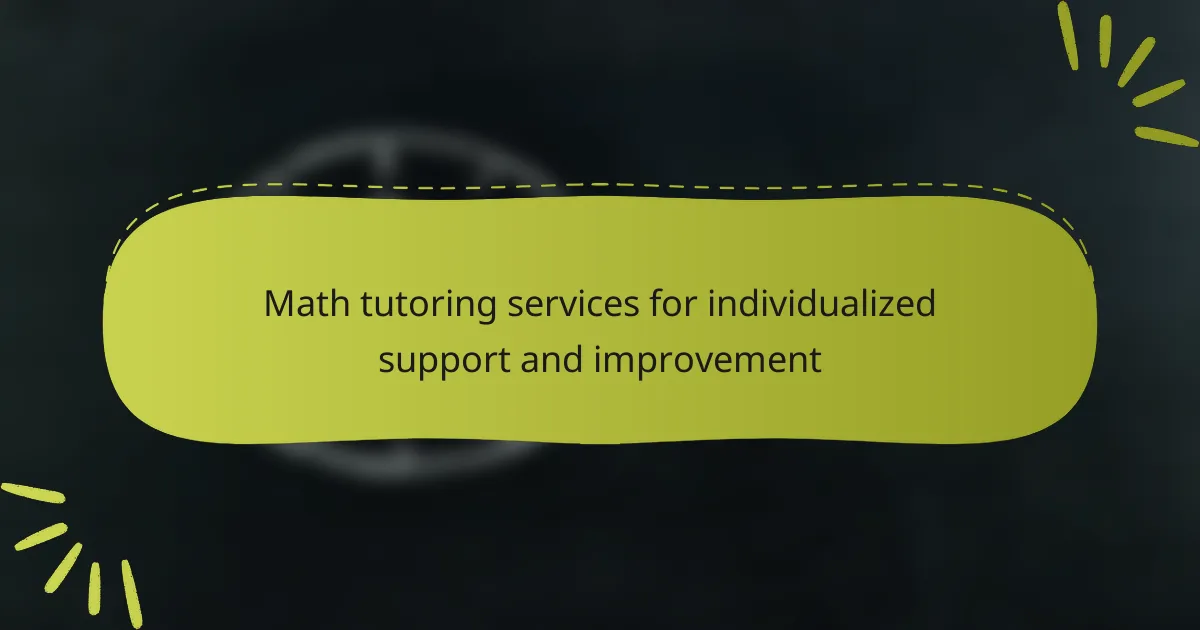Online math games are interactive digital platforms designed to enhance mathematical abilities through engaging puzzles, quizzes, and challenges. These games cater to various age groups and skill levels, making math learning accessible and enjoyable while promoting problem-solving skills. Research indicates that using these games can lead to improved retention and understanding of mathematical concepts, with studies showing significant increases in test scores among students who engage with them. The article explores different types of online math games, including puzzle games, interactive quizzes, strategy games, and simulations, highlighting their role in fostering a positive learning environment and encouraging continuous practice through gamification and personalized experiences.

What are online math games for skill development and engagement?
Online math games for skill development and engagement are interactive digital platforms designed to enhance mathematical abilities. These games often incorporate puzzles, quizzes, and challenges that require problem-solving skills. They cater to various age groups and skill levels, making math learning accessible and enjoyable. Research indicates that such games can improve retention and understanding of mathematical concepts. For instance, a study published in the Journal of Educational Psychology found that students using math games showed a 20% increase in test scores compared to those who did not. These games also promote engagement through rewards and competitive elements, making learning more appealing.
How do online math games facilitate skill development?
Online math games facilitate skill development by providing interactive and engaging learning experiences. These games encourage problem-solving and critical thinking through challenging tasks. Players often receive instant feedback, which helps them understand their mistakes and improve. Additionally, online math games adapt to individual skill levels, ensuring personalized learning. Research shows that gamified learning increases motivation and retention of mathematical concepts. A study by Hamari et al. (2016) found that game-based learning significantly enhances student engagement and achievement in math.
What specific math skills can be improved through these games?
Online math games can improve various specific math skills. These skills include addition and subtraction, multiplication and division, and problem-solving abilities. Games often focus on enhancing number sense, which is crucial for understanding quantities and relationships. Players can develop spatial reasoning skills through geometry-based challenges. Additionally, games may strengthen pattern recognition and critical thinking skills. Research indicates that interactive gameplay can lead to better retention of mathematical concepts. A study by the University of California found that students using math games showed a 20% increase in achievement scores compared to those who did not.
How do online math games engage learners differently compared to traditional methods?
Online math games engage learners by incorporating interactive elements that traditional methods lack. These games provide immediate feedback, allowing students to understand mistakes in real-time. Traditional methods often involve delayed feedback, which can hinder learning. Online math games use gamification techniques, such as rewards and levels, to motivate students. This intrinsic motivation is less prevalent in traditional classroom settings. Additionally, online math games often allow for personalized learning experiences. They adapt to a learner’s skill level, which is not typically possible in a standard classroom. Research shows that students who use online games demonstrate higher engagement levels and improved problem-solving skills. A study by Hamari et al. (2016) found that gamification significantly enhances user engagement in educational contexts.
Why are online math games important for student engagement?
Online math games are important for student engagement because they make learning interactive and enjoyable. These games encourage active participation, which enhances motivation. Studies show that students who play educational games demonstrate improved retention of mathematical concepts. For example, a study by the University of Colorado found that students using math games scored 20% higher on assessments. Additionally, online math games provide instant feedback, allowing students to identify and correct mistakes immediately. This immediate reinforcement helps solidify understanding. Furthermore, these games often incorporate elements of competition and rewards, which can further drive engagement. Overall, online math games effectively capture student interest and promote deeper learning in mathematics.
What role does motivation play in the effectiveness of online math games?
Motivation significantly enhances the effectiveness of online math games. It drives engagement and encourages persistence in learning. When students are motivated, they are more likely to participate actively in the game. Research indicates that intrinsic motivation leads to better learning outcomes. For example, a study published in the “Journal of Educational Psychology” found that motivated students performed better in math tasks. Additionally, motivation influences the time spent on tasks, which correlates with skill mastery. Thus, motivation is a key factor in maximizing the educational benefits of online math games.
How do these games cater to different learning styles?
Online math games cater to different learning styles by incorporating various interactive elements. Visual learners benefit from colorful graphics and animations that illustrate mathematical concepts. Auditory learners engage with sound effects and verbal instructions that reinforce learning. Kinesthetic learners participate actively through hands-on activities and movement-based tasks within the game.
Additionally, these games often include adaptive challenges that adjust to individual skill levels. This personalization ensures that learners of all styles can progress at their own pace. Research shows that incorporating multiple learning modalities enhances retention and understanding. A study published in the “Journal of Educational Psychology” highlights that games that address diverse learning styles improve student engagement and achievement.

What types of online math games are available?
There are several types of online math games available. These include puzzle games that challenge problem-solving skills. There are also interactive quizzes that test knowledge on various math topics. Strategy games require players to use math concepts to progress. Additionally, simulation games help users apply math in real-world scenarios. Educational platforms offer games tailored to different age groups and skill levels. Many of these games incorporate rewards to enhance engagement. Research shows that game-based learning improves understanding and retention of math concepts.
What are the most common formats of online math games?
The most common formats of online math games include interactive quizzes, puzzles, and simulations. Interactive quizzes often feature multiple-choice questions that test mathematical concepts. Puzzles engage players with challenges that require problem-solving skills. Simulations provide realistic scenarios where players apply math in practical situations. These formats enhance learning through engagement and immediate feedback. Research indicates that interactive formats improve retention of mathematical concepts. For example, a study by the National Center for Education Statistics found that students using interactive math games showed higher achievement levels compared to traditional methods.
How do puzzle-based games differ from competitive math games?
Puzzle-based games focus on problem-solving and logic, while competitive math games emphasize speed and accuracy in math skills. Puzzle-based games often involve individual play, where players solve challenges at their own pace. In contrast, competitive math games typically feature timed rounds and direct competition against others. Puzzle-based games encourage critical thinking and creativity, while competitive math games promote quick calculations and strategic thinking. Research indicates that puzzle-based games can enhance cognitive skills, while competitive math games improve math fluency and performance under pressure. Both types of games serve different educational purposes within the realm of online math engagement.
What are some examples of popular online math game platforms?
Khan Academy, Prodigy Math, and IXL are popular online math game platforms. Khan Academy offers interactive lessons and practice problems. Prodigy Math engages students through a game-based learning environment. IXL provides personalized math practice with immediate feedback. Each platform is designed to enhance math skills while keeping learners engaged.
How can educators integrate online math games into their curriculum?
Educators can integrate online math games into their curriculum by aligning the games with learning objectives. They should select games that reinforce specific math concepts being taught. For instance, if the focus is on fractions, educators can choose games that challenge students to solve fraction problems.
Incorporating these games can be done during math centers or as homework assignments. Teachers can also use games for formative assessments to gauge student understanding. Research shows that 70% of students report increased motivation when engaging with educational games.
Additionally, educators can facilitate discussions around game strategies to deepen understanding. They can encourage collaboration by having students work in pairs or small groups. This approach not only enhances learning but also builds social skills.
What strategies can teachers use to select appropriate games for their students?
Teachers can use several strategies to select appropriate games for their students. First, they should align games with educational objectives. This ensures that the games reinforce specific math skills. Second, teachers should consider the age and skill level of their students. Games should be challenging yet accessible to maintain engagement. Third, they can evaluate the game’s content for accuracy and relevance. This helps ensure that students learn correct mathematical concepts. Fourth, teachers should seek games that promote collaboration and communication. These aspects enhance social learning experiences. Finally, teachers can gather feedback from students about their gaming experiences. This feedback can guide future selections and improve engagement.
How can online math games be used for assessment and feedback?
Online math games can be effectively used for assessment and feedback by providing immediate results on student performance. These games often include built-in analytics that track progress and identify areas needing improvement. Educators can use this data to tailor instruction to individual student needs. The interactive nature of these games engages students, making them more likely to participate actively. Additionally, games can offer instant feedback, allowing students to learn from mistakes in real-time. Research indicates that gamified learning environments enhance retention and understanding of mathematical concepts. For instance, a study by Hamari et al. (2016) found that game-based learning significantly improves student engagement and performance in mathematics. Thus, online math games serve as a valuable tool for both assessment and feedback.

What are the key benefits of using online math games?
Online math games enhance learning by making math enjoyable and interactive. They engage students through gamification, which increases motivation. Research shows that students who play math games demonstrate improved problem-solving skills. These games often provide immediate feedback, allowing learners to correct mistakes in real-time. Additionally, online math games can be tailored to different skill levels. This personalization helps address individual learning needs effectively. Studies indicate that consistent use of math games leads to higher retention of mathematical concepts. Overall, online math games foster a positive learning environment and encourage continuous practice.
How do online math games enhance problem-solving skills?
Online math games enhance problem-solving skills by providing interactive and engaging environments for practice. These games often present challenges that require critical thinking and strategy. Players must analyze problems, identify patterns, and apply mathematical concepts to succeed. Research shows that such interactive learning can improve cognitive abilities. A study by the University of Central Florida found that students who engaged in math games scored higher on problem-solving assessments. This evidence supports the effectiveness of online math games in developing essential problem-solving skills.
What cognitive benefits do students gain from playing these games?
Students gain several cognitive benefits from playing online math games. These games enhance problem-solving skills by presenting challenges that require critical thinking. They improve memory retention as students practice and recall mathematical concepts. Online math games also foster spatial reasoning, which is crucial for understanding geometry and visualizing mathematical problems. Additionally, these games can increase motivation and engagement, leading to better focus during learning activities. Research shows that gamified learning environments can lead to higher academic performance. A study published in the Journal of Educational Psychology found that students using educational games scored significantly higher on math assessments compared to those who did not.
How do online math games promote collaboration among students?
Online math games promote collaboration among students by creating interactive environments for teamwork. These games often require players to solve problems together, fostering communication skills. Students must share strategies and discuss solutions, enhancing their collaborative abilities. Many online math games feature team-based challenges that encourage group participation. Research indicates that collaborative gameplay improves problem-solving skills and social interactions. A study by Vasalampi et al. (2020) found that students engaged in collaborative math games showed increased motivation and cooperation. This collaborative aspect not only aids in learning but also builds a sense of community among peers.
What challenges might educators face when using online math games?
Educators may face several challenges when using online math games. One major challenge is ensuring equitable access to technology. Not all students have reliable internet or devices at home. This can create disparities in learning opportunities. Another challenge is the varying levels of student engagement. Some students may lose interest quickly, affecting their learning outcomes. Additionally, educators might struggle with integrating these games into the curriculum effectively. This requires aligning game content with educational standards. Moreover, teachers may find it difficult to assess student progress accurately through online games. Traditional assessment methods may not apply well in this context. Lastly, technical issues can disrupt gameplay, leading to frustration for both educators and students. These challenges can hinder the effective use of online math games in educational settings.
How can technical issues impact the effectiveness of online math games?
Technical issues can significantly hinder the effectiveness of online math games. These issues can include slow loading times, glitches, and connectivity problems. Slow loading times can frustrate users, causing them to abandon the game before completing tasks. Glitches can disrupt gameplay, leading to confusion and decreased engagement. Connectivity problems can prevent access to the game, limiting user participation. Research shows that technical failures can lead to a 70% increase in user drop-off rates. Therefore, resolving technical issues is crucial for maintaining player interest and ensuring educational outcomes.
What strategies can be employed to overcome resistance from students or parents?
Engaging students and parents in online math games requires specific strategies to overcome resistance. First, clear communication about the educational benefits is essential. Highlight how these games enhance math skills and promote engagement. Providing data, such as studies showing improved performance through game-based learning, can reinforce this message.
Involving parents in the process can build support. Organizing workshops or informational sessions can demonstrate how to effectively use the games. Offering trial periods allows students and parents to experience the games without commitment.
Creating a supportive community around the games fosters motivation. Encouraging peer collaboration and sharing success stories can make participation more appealing. Additionally, addressing specific concerns, such as screen time, by emphasizing the educational value can alleviate resistance.
Regular feedback from both students and parents helps refine the approach. Gathering input can lead to improvements that better meet their needs. These strategies collectively create a positive environment for adopting online math games.
What tips can educators follow to maximize the effectiveness of online math games?
Educators can maximize the effectiveness of online math games by integrating them into the curriculum. Aligning games with learning objectives enhances relevance. Providing clear instructions ensures students understand game mechanics. Encouraging collaboration among students fosters teamwork and communication skills. Monitoring student progress allows for tailored feedback and support. Incorporating a variety of games caters to different learning styles. Setting specific goals motivates students to engage actively. Lastly, reflecting on game outcomes promotes continuous improvement in teaching strategies.
How can feedback be effectively provided during gameplay?
Feedback can be effectively provided during gameplay by using timely and specific comments. Immediate feedback helps players understand their performance right after an action. Tailoring feedback to individual player needs enhances its effectiveness. For example, if a player makes an error, a constructive comment pointing out the mistake can guide improvement. Using visual indicators, such as color coding, can also reinforce feedback. Research shows that players respond positively to feedback that is clear and actionable. According to a study by Hattie and Timperley (2007), effective feedback significantly boosts learning outcomes. Thus, integrating these strategies can lead to better skill development and engagement in online math games.
What best practices should be followed for incorporating online math games into lessons?
Incorporating online math games into lessons requires careful planning and execution. First, align games with curriculum objectives to ensure they reinforce key concepts. Use games that cater to diverse learning styles to engage all students effectively. Monitor progress through game analytics to assess student understanding. Provide clear instructions and support to facilitate smooth gameplay. Encourage collaboration by allowing students to work in pairs or groups. Limit game time to maintain focus and prevent distractions. Finally, gather feedback from students to improve future game integration. These practices enhance learning outcomes and keep students motivated.
Online math games are interactive digital platforms designed to enhance mathematical skills and engagement among learners. These games utilize puzzles, quizzes, and challenges to promote problem-solving abilities across various age groups and skill levels, with research indicating significant improvements in retention and understanding of mathematical concepts. The article explores how these games facilitate skill development, the specific math skills they improve, and their advantages over traditional learning methods. Additionally, it discusses the role of motivation, diverse learning styles, and effective integration strategies for educators, while also addressing potential challenges and best practices for maximizing their effectiveness in the classroom.



